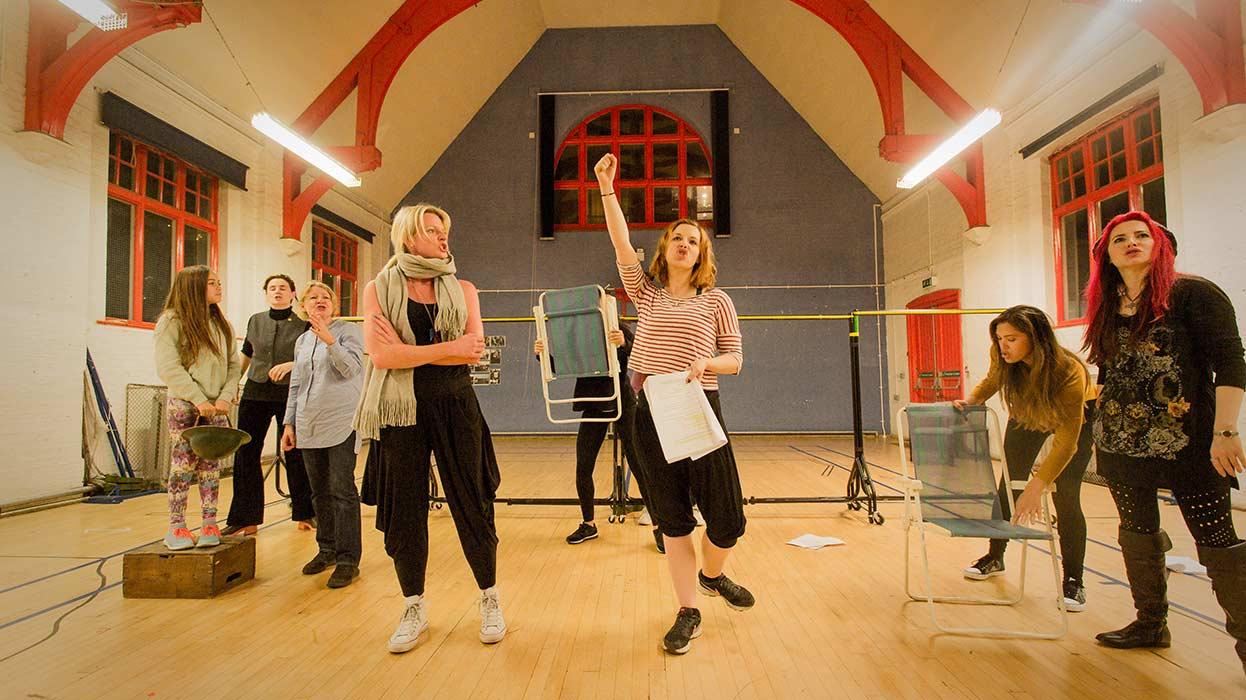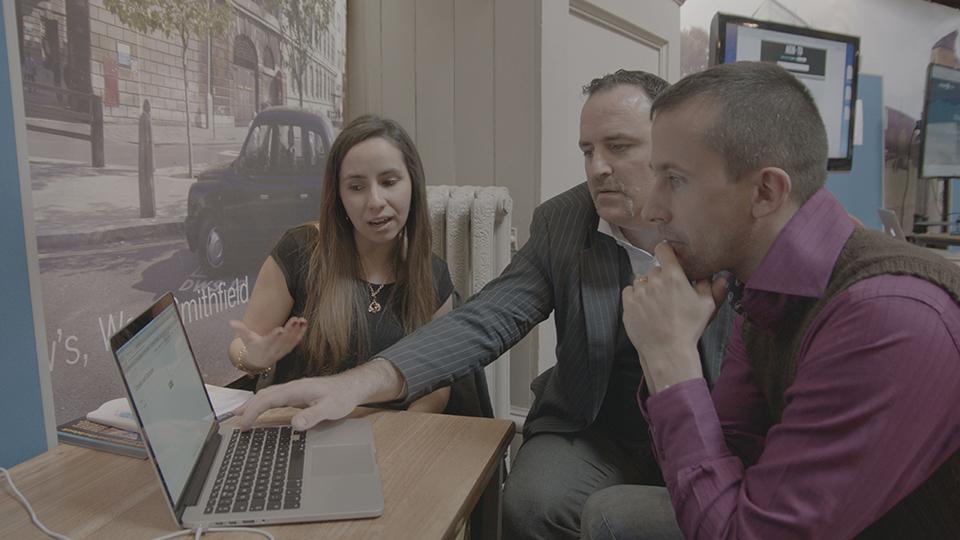World’s first computer-generated musical set for West End premiere
Primary page content
The first musical theatre production to be conceived and crafted by computers makes its debut in February 2016, with a premise and plot created by Goldsmiths, University of London’s ‘What-If Machine’.

The cast of Beyond the Fence rehearse
A two-part show about the development of Beyond the Fence will air on Sky Arts at 8pm on Thursday 25 February and 8pm Thursday 3 March. The entire musical will be broadcast after the second episode.
2016. The computer revolution. In a world becoming ever more technologically advanced and reliant upon computers, machine learning and artificial intelligence are rapidly and fundamentally changing every aspect of human experience.
But how does technology affect art and the creative process? Can a computer ever create an entertaining and emotionally powerful show?
Presented by Wingspan Theatricals and Sky Arts, Beyond the Fence runs at the Arts Theatre in London’s West End from 22 February – 5 March 2016, directed by Luke Sheppard, choreographed by Cressida Carre and produced by Neil Laidlaw.
Beyond the Fence is both conceived and substantially crafted by computer, modeled on a statistical study of the ‘recipe for success’ in hit musicals.
In collaboration with leading experts in music, computation and the science of human creativity, composer Benjamin Till and his husband, writer and actor Nathan Taylor (the award-winning team behind Channel 4’s ‘Our Gay Wedding: The Musical’), will bring a range of computer-generated material to life.
Designed and co-ordinated by Dr Catherine Gale, the whole process is also being filmed for a Sky Arts TV series titled ‘Computer Says Show’, to be broadcast in spring 2016.

(Dr Teresa Llano from Goldsmiths explains to Benjamin Till and Nathan Taylor the workings behind the What-If Machine, the system that has provided the premise for ‘Beyond the Fence’)
Beyond the Fence started as an experiment, with researchers delving into what makes a good musical, from production and story to music and lyrics.
The process began with a predictive, big data analysis of success in musical theatre conducted at the University of Cambridge. Researchers interrogated everything from cast size to backdrop, emotional structure to the importance of someone falling in love, dying (or both!) – in more and less successful shows – to create a set of constraints to which the musical had to conform, to theoretically optimise chances of success.
Next, the team visited what’s known as the What-If Machine at Goldsmiths.
The Machine was created under a three year initiative, starting in 2013, to answer the question of whether creative software can move to the next level by generating, assessing, and presenting interesting ideas – whether it’s stories, jokes, films or paintings - that are really valued by the people who are exposed to them.
Funded by the European Community’s Seventh Framework Programme and with Professor Simon Colton, Dr Teresa Llano and Dr Rose Hepworth (Department of Computing) at the helm, the machine generated multiple central premises, featuring key characters, for a show.
From those options, the team selected this as the starting point and the original idea for the musical:
What if a wounded soldier had to learn how to understand a child in order to find true love?
September 1982. Mary and her daughter George are celebrating one year of living at the Greenham Common peace camp. The group of women they have joined are all committed to stopping the arrival of US cruise missiles through non-violent protest. When Mary is faced with losing her child to the authorities, an unlikely ally is found in US Airman Jim Meadow. How can she continue to do what is best for her daughter while staying true to her ideals?
A plot structure for the musical was also generated computationally, thanks to work led by Dr Pablo Gervás (Complutense University of Madrid), with a team then writing lyrics with the assistance of some other computational tools, that fitted all these constraints.
Finally, the music has been provided by Dr Nick Collins (Durham University) through his computer composition system Android Lloyd Webber, based on a machine listening analysis of musical theatre music at Queen Mary and City University, with additional material generated using the FlowComposer system created at SonyCSL, Paris.
Read more about Beyond the Fence on the Guardian website, Evening Standard and What's On Stage.
Beyond The Fence
Arts Theatre, 6-7 Great Newport St, London WC2H 7JB
22 February – 5 March 2016
Booking: beyondthefencemusical.com / 020 7836 8463 @BeyondTheFence #ComputerMusical